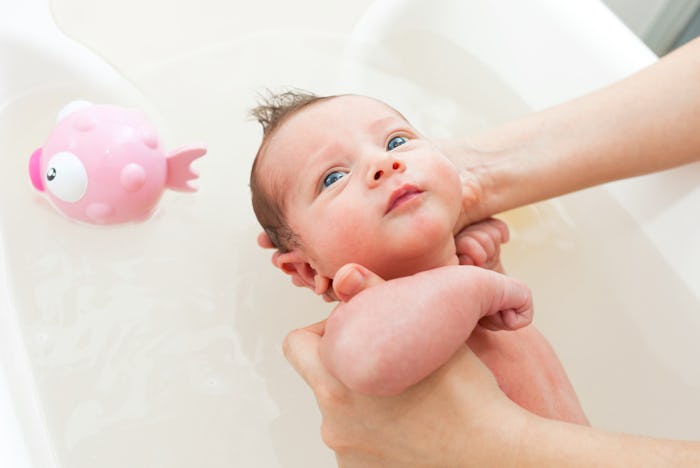When I was expecting my first baby, I loved stocking up on all the adorable bath gear. I mean, does it get any cuter than a faux-fur bunny bath wrap? But, when the time came to actually bathe my newborn, it was not the dreamy bonding experience I had anticipated. Lifting a fragile, slippery baby was stressful, and there were some tears (and maybe not just from baby). That's why I've rounded up 5 things you didn't know about your baby's first bath, because it's important to go in with the right attitude and expectations.
Before jumping right to the first time you bathe your baby at home, it's worth noting that there some important things to know about your baby's first-ever bath, which is usually done at hospital after birth. You may be keen on getting the strange-looking white stuff, known as vernix, off but best practices have started to shift on when that first bath should take place, according to Elizabeth Smith and Terriann Shell, writing for the International Childbirth Education Assocation (ICEA).
In fact, several organizations, including the World Health Organization (WHO), now recommend delaying the first bath. "Bathing should be delayed until 24 hours after birth. If this is not possible due to cultural reasons, bathing should be delayed for at least 6 hours," according to guidelines on maternal and newborn care from the World Health Organization.
It turns out that delaying the baby's bath and leaving the vernix on the skin is beneficial for a whole lot of reasons, including helping to reduce the risk of infection, stabilize infant blood pressure, improve temperature control, improve maternal-infant bonding and breastfeeding, and more, according to Children's MD.
However, each hospital follows their own protocol when it comes to when your baby is bathed. If you want to delay the process, you may need to speak up and have a note added to your chart (I did)! And when the time comes for you to start doing bath time on your own, here are five things you'll want to know before plunging in.
1It's All About The Sponge Bath
I could hardly wait to break out the baby bath tub, but you really don't need it for those early weeks at home with your newborn.
"During her first week or two, until the stump of the umbilical cord falls off, your newborn should have only sponge baths. In a warm room, lay the baby anywhere that’s flat and comfortable for both of you — a changing table, bed, floor, or counter next to the sink will do," advised Healthy Children, which added that your baby should be strapped in if on an elevated surface.
To give a sponge bath, you'll want to make sure you have all your supplies (washcloth, dry towel, soap, clean diaper) ready, so that you don't have any excuse to leave your baby alone, advised The Bump.
When you're ready to begin, your best bet is to go slow and steady and you'll want to cleanse one area at a time, explained WebMD.
2Both Water and Room Temperature Matter
You're probably already going through a mental checklist of what you need to do for that first bath, but checking the water heater might not be on your radar. But, since babies can be easily burned it's important to be especially mindful of water temps.
"To prevent scalding, set the thermostat on your water heater to below 120 F (49 C). Always check the water temperature with your hand before bathing your baby. Aim for bath water around 100 F (38 C)," explained Mayo Clinic.
What's more, babies can be easily chilled so it's a good idea to keep the room warm during bath time. A good room temperature to target is between 75 and 80 degrees, recommended What to Expect, which added that "you can turn up the thermostat or steam up the room by letting the shower run on hot for a few minutes."
33.. You Don't Need Bath Toys (Yet)
You'll probably get a boatload of adorable bath toys as shower gifts, but, for now, they can remain in their packaging.
"Bath toys are not really needed for very young babies, as the stimulation of the water and washing is exciting enough. Once a baby is old enough for the bathtub, however, toys become invaluable," explained Healthy Children.
When your baby is ready for bath toys, just make sure you're cleaning them regularly!
4It May Not Be Calming
I totally anticipated my baby's first bath to be a quiet, soothing moment that I'd cherish forever. Uhh, not so much. The good news is that it's normal for your baby to protest bath time.
"While most little ones love it, if your baby balks (he fusses or turns his head), don't sweat it — just cuddle instead. Pretty soon, you'll figure out what works best," explained What to Expect.
It's true, after a while my daughter did start to love splashing in the water.
5Daily Baths Aren't Necessary
As you adapt to life with a newborn, you're most likely trying to figure out your routine, but bath time doesn't have to be included in your daily schedule.
"There's no need to give your newborn a bath every day. Three times a week might be enough until your baby becomes more mobile. Bathing your baby too much can dry out his or her skin," explained Mayo Clinic.
Until your baby is crawling and getting into messes, it's not necessary to bathe your baby more than a few times a week, advised Baby Center.
